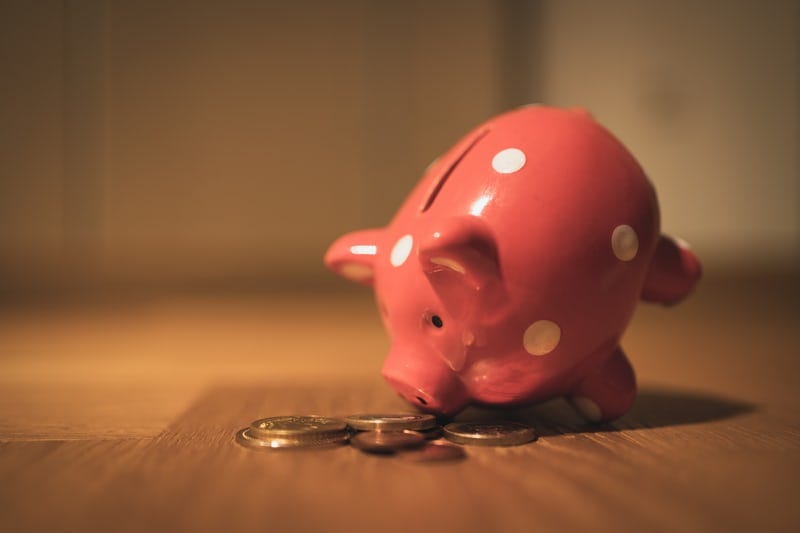How?
Because you already have a system in place, habits that work, people that motivate you, cherish your time and most importantly, got in at the right time at the right place.
Most underestimate how important luck plays into everything.
Life is naturally unfair. Women earn less and minorities and people of color are marginalized.
Instead of complaining, use racism and sexism to your advantage. The best way to increase your chances is to simply take more calculated risks, not care about appearing embarrassed or not intelligent and most importantly knowing who to listen to.
The truth is, people always have opinions, especially the higher you go but it’s up to you to block out the noise and listen to your own vision. That will help you create your own asset class, not work in an unstable job market and most importantly, go from debt to millionaire in no time.

Timing Rule
Getting rid of debt and paying it off is no easy task but remember, it was easiest to get into it.
Is it easier to delay your credit card payment in full each month or buy that fancy bag?
Most likely grab that shiny new bag that only depreciates in value than sit with your finances for 5 mins.
These days with modern technology and the emergence of FinTech, there’s absolutely no excuse to be made for getting into credit card debt. Collectively Americans are in trillions of dollars in debt by simply not paying back their statements. To make it easier on yourself, set up automatic payments so you don’t even have to do it! Just make sure there’s enough cash in your checking account so the payment won’t bounce and you end up incurring fees as if you didn’t pay it back.
Get rid of the interest paying debt and pay off what you’ve spent per month. Simple but hard for millions.
The first step towards financial freedom is to get rid of any liabilities that are harming your credit score while confirming you always earn more than you spend (income > expenses). Not all debt is bad, especially a mortgage that can easily help pave your way towards millionaire status but everything starts with having a good credit score as banks have become stringent since the Housing Crisis in ‘08.
When you receive your paycheck, allocate as much as possible to match your employer based 401 (k) and then save 50% of your after-tax-income. This will put you on the best path towards developing a stable savings plan then eventually let it compound in the market.

ROI
Once you’ve set that in stone, those who’ve gone out of debt quickly have asked themselves, how much value add to society?
They don’t think in years and decades down the road, rather they think in months.
What’s next? Always ask yourself that. There will be hurdles but that cannot stop you.
Whenever learning about personal finance and business in school, if ever, the behavioral and physiological aspects are undervalued and are the essence of getting to where you want to go.
Putting your plan into action starts with planning for the worst, hoping for the best, setting out small, realistic goals on what you want to accomplish in the next few weeks to months and pin-pointing your ideal scenario.
You can’t be too specific because then you’ll be upset when life takes its course, as it always does but understanding you have more control than you think will put you on the best path forward.

Focus on Future Compound
We discussed earlier the importance of getting rid of toxic liabilities such as auto to luxury good loans that can harm your credit score, job prospects and future cash flow opportunities. That is separate from saving. Saving is always necessary to keep yourself afloat in case of an emergency.
Most financial planners/professionals suggest roughly 6 months of expenses because they don’t truly care about your financial wellbeing and are too jolly about the unexpected which unfortunately always needs to be considered to be rich.
That’s why a 6–12 month emergency cash load will not only give you a piece of mind, but a stable more fruitful future than 60% of Americans living paycheck to paycheck unable to pay for a $1k unexpected expense. Because remember, during a recession, you might not just loose your job, the stock market will be bearish for a few months which means you’ll have to liquidate your assets and pay taxes on your gains, have to find new renters for your property, possibly move, search endlessly for a new job, take care of kids and attempt to lower your cost of living if possible.
Too many ‘what if’s’. Saving isn’t as great as investing for obvious reasons most notably the return, but it is necessary and can never be overlooked.

How Not To Save
The worst thing you can do is focus on the small expenses. Obviously they compound but the good news is, you can still drink that Starbucks every day, although I don’t recommend it because you can simply be a little less lazy and make it yourself.
Yet in the grand scheme of things, the rich value their time and aren’t usually focused on the Starbucks that is worth $5 that will be worth $1200 in the future.
Rather they ask themselves what can they do now that’s going to make them an extra ten thousand dollars in the future.
Especially when staring out, don’t expect your salary or any W2 income to make you rich. By the time you come to pay for taxes, your cost of living and insurance, its practically all gone.
Whether it’s the skills or license/certification, understand best what can help you make that next 10k. The Starbucks will help you save a few thousand over time but to really move the needle in your life, ask yourself, what are the tangible actions I can take now to propel my future?
Tax Tricks
The rich call everything a business. Even if you are loosing money, you can still charge your vacation, if you have a legitimate reason such as meeting with clients or touring new homes as an independent real estate agent) to your business.
Working for yourself will allow you to earn more in less time by letting your mind work not your hands or clock-in time.
Say you bought a laptop for $100 (to keep numbers simple) and you pay about 30% in taxes from your income, earning less than a million you pay up to 40% in certain states such as NY, NJ and California. When you buy that $100 laptop you have to make roughly 30% more, to supplement taxes. If you have a side hustle from mowing lawns to blogging, you can easily charge the laptop and call it a business expense. It could be deemed as a tax write-off as a deduction against your business income not spending a dime out of your own pocket.
That’s what the have vs the have-nots follow.

Real Estate
Ideally you want to look out for properties that are below market value.
How to do this?
Look at the heartland of America where city dwellers have been flocking to throughout the pandemic to get more bang for their buck, pay less in taxes, housing operational fees and an overall lower cost of living.
The price of real estate is dictated by earned income and the competition for opportunities. NY, NJ and California’s median home prices are roughly $1.5m because the average salary is $100k right out of school.
Although cities have witnessed rents plummet due to the virus, they are slowing rising now as restaurants and gathering places are reopening but if I had to choose to manage tenants in South Carolina or NYC, I would always go with the suburbs, although rental control is probably looser. You can read about my first rental experience here.
Another mistake I see people make is to spend time looking for their dream house, especially when they’re young.
People only stay in a property for roughly 8 years and with 80% of buyers having remorse, it’s important to weigh renting luxury versus buying utility, something I recommend.
Invest in Fundrise, Crowdstreet or Yieldstreet where you don’t have to manage tenants to add diversification into your portfolio. Crowdfunding (managed properties) and REITs (Real Estate Investment Trusts-traded on the market) will do the hard labor for you and all you have to do is invest.
In short real estate is best during any time because it retains its value, is an inflation hedge, outperforms the stock market (many times), offers lower risk and more return, debt is good and is always in demand since people need to live somewhere.
Focus on establishing credit and paying it off to build a home equity line of credit and then you can go on to owning multiple properties.

Alternative Investments
This is an underrated but true secret to a killer portfolio.
Yale and Harvard’s endowments are the largest and most profitable college endowments that ironically have the most conservative, moderate approach of them all. They have weighting in roughly 40% of alternative investments which include private equity, hedge funds, VC (venture capital), artwork, real estate and even commodities such as lumber with a split fo 60% stocks 40% bonds.
They focus on diversification and this past year Yale had an average return of 13% compared to 9% for a traditional portfolio with a more conservative approach.
Stocks/Equity Investing
When starting out, most Millenails and GenZers are obsessed with the meme hot stocks on retail trading apps that are talked about on Reddit. Yet the best way to invest is to go in with the mentality to STAY rich not BE rich overnight.
Removing emotions, social media and carefully choosing who you listen to is best.
To let your money really work for you, you have to do less work which stems into investing in ETFs and index funds.
Lastly, don’t even think about margin buying. With 80% of day traders loosing money, you are almost certain to have to pay back what you borrowed and lost.

HSA (Health Saving Account)
This is an account that isn’t talked about much by the 99% because it seems too good to be true.
It allows you to pay lower federal income taxes by making tax-free deposits each year. You can use the account to pay for medical expenses and funds roll over year over year as your account continues to grow.
This will allow you to avoid paying out of pocket for expensive medical bills, if you don’t have insurance and you can even trade stocks with the money deposited into the account.
Retirement
Max all your benefits and try to save 50% of your after-tax income to ensure a steady boat when it comes to living with no earned income.
Retirement is a scary time. You are weaker, older, have less energy and need to rely on your hard work from your past life to keep you afloat.
The trick with social security is to take it out as LATE as possible to get better benefits. The younger and healthier you are, the later it should be. The unhealthier you are, earlier if you think you’re going to die and might as well use the cash before the government takes it from you.
Social security is a payment given out to you by the government once you hit the retirement age of 65 but once you pass, unless your spouse is retired as well, they won’t get it nor will your children so use it wisely.
The rich follow boring but practical tactics to help them build the path they’ve always dreamed of. Clearly, there are no secret tactics besides taking the time, patience and diligence to be rational about your decisions.
Anyone can follow these steps if they really wanted to but what’s most difficult is never blowing out of proportion your earnings and rather staying humble and prudent to enjoy the fruits of life in a responsible manner.
It takes a generation to build it up and a night to blow it off.

